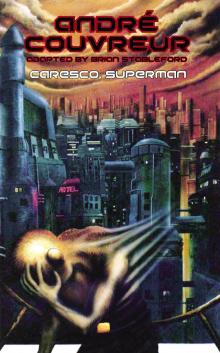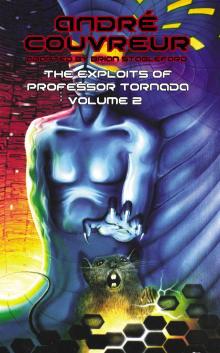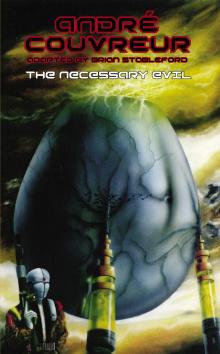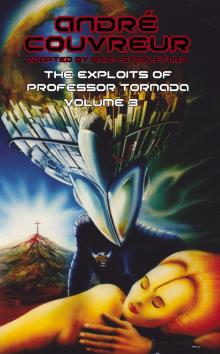- Home
- André Couvreur
The Exploits of Professor Tornada (Vol. 3) Page 17
The Exploits of Professor Tornada (Vol. 3) Read online
Page 17
The Baronne, of course, remained invisible, in mourning for her husband.
As it was necessary to expect, the medico-legal profanation was ordered. For the Baronne, it was another painful ordeal when she watched from her window the departure of the truck taking the remains of her Tani to the Morgue, with no one by her side to boost her morale. Of her two great friends, Tornada, by virtue of his notoriety, was to witness the autopsy, while Félix Vion, suddenly taken ill, was confined to bed. Adversity seemed to be conspiring against her in all directions.
The posthumous inquisition was, at any rate, limited to a simple observation. Science did not have to intervene with the difficulty that other crimes—such as poisoning—presented, necessitating the removal of the viscera, the search for toxins in the fluids, and extensive laboratory work. In his case, it was only necessary to lift away a few ribs, on order to uncover the heart, to observe the nature of the wound. The blow had been struck downwards, perforating the heart to a depth of about four centimeters, certainly mortal, as skillfully as an anatomist might have done. The sole particularity, according to the measurement of the perforating wound, the weapon used had two cutting edges, but extremely sharp.
“In sum,” the medical examiner concluded, for the benefit of the audience, including Professor Tornada and the examining magistrate, “there does not seem to be anything capable of assisting the discovery of the murderer.”
“Who can tell?” Monsieur le Clair put in. “Will your report, Doctor, which I await, specify the quality of the weapon used?”
“That goes without saying.”
“And that the person who used it must have possessed a sufficiently exact knowledge of the region that he perforated?”
“One might suppose so—but one does not have to be a specialist to strike in the right place.”
“That’s all I wanted to know,” said the magistrate, beaming. He drew Tornada into a corner of the sinister room. “One question, if you please, Master.”
“To serve justice, there is nothing I can refuse you.”
“I believe you know the associate of the man who has just been autopsied?”
“Vion? He’s a close friend.”
“Since when?”
“Since the age when we threw paper balls at ceilings in order to suspend manikins hanging by a thread.”
“At school, in consequence.”
“You have a remarkable deductive mind.”
“And after school?”
“The Latin quarter.”
“Ah, the Latin quarter. And in what capacity was Monsieur Vion there. Studying law? Medicine?”
“He thought, as I did, of climbing the steps of the temple of Aesculapius, but he soon gave it up.”
“For what reason?”
“The horror of wounds, of blood, of cadavers. He had that in common with the poor Baron. If the latter, from the height of Paradise, to which his pure existence has surely directed him, has been able to observe the maneuvers that have just been carried out on his remains, I’m convinced that a faint will already have taken him to the celestial infirmary.”
The whimsy and irreverence of the strange scientist for everything to do with death was too well-known for the magistrate to be shocked by hearing him making fun of the remains, scarcely sewn up again, of the man with whom he had been rubbing shoulders in life only the day before. He persisted regardless: “Nevertheless, Monsieur Vion practiced dissection?”
“Evidently, since that was what deterred him from continuing his medical studies.”
“That’s all I wanted to know.”
“It’s too much, and too little,” Tornada mocked, sensing in those questions the birth of an error, and promising himself an amusement, after his own fashion.
The permission for burial succeeded the macabre examination. The Baron was taken back to the Avenue de l’Alma. That provided Betty with a beneficent diversion. It was necessary to prepare the ceremony with all the ostentation that the great captain of finance warranted. She instructed the Funeral Directors to spare no expense. She selected a fashionable architect to draw up plans for a crypt in the modern style, in which a place would be reserved for her to occupy at a future date. One does not suspect what a fashionable woman owes to the gaze of others in such cruel circumstances.
Her personal preparations were no less taxing. She could not dress like just anyone. It was necessary to set all the specialists in mourning—dressmakers, milliners and hairdressers—to work. And the jeweler, of course! She had noticed some time before, in a shop window in the Avenue de l’Opéra, two lovely black ear-rings, a brooch and three rings with Indian black diamonds, which would go very well with the mourning-dress of a rich client. It was not that she had wanted to wear them one day—good God no!—but, just in case, she had kept the address of the jeweler’s. And for lack of purchasing power among those condemned to eternal regret in the interim, the gems were still there. Her faithful Marie, who accompanied her in her excursions, persuading her of the necessity, she ended up acquiring them for exactly a hundred thousand francs. The need for ostentation, which had never abandoned her, repossessed her under the lash of the drama as powerfully as in the time when she had triumphed in Hollywood—and that was, in truth, forgivable. The imprint of an ancient profession persists.
In making these preparations, Abrovici drove her morning and night. He too was impressive in his white suit, converted into mourning by a crêpe armband. She was obliged to leave to employees of the bank, to the deputy director Monsieur Dittelin, the chore of sending out the bereavement notices; to Marie the pious mortuary vigil; and the staff the organization of the file of visitors. Many came, and important ones. Never had the suit of a great man, sovereigns apart, been sprinkled with so much holy water.
The result was that Tornada, who did not want to abandon her at such a sad time, was not able to join her. In spite of arranging meetings by telephone, he found, on presenting himself at the Avenue de l’Alma, that Madame la Baronne apologized for having gone out on an errand. He was only able to catch up with her on the eve of the burial.
That evening, she was in her sumptuous dressing-room, in the care of a hairdresser who was attaching an artificial torsade on to top of her perm. As soon as her friend appeared she ran to take refuge in his arms, uttering a deep sigh. She allowed herself to be gently patted on the shoulder. Eventually she straightened up to inquire after Félix.
“A nasty fever, which has obliged me to confine him to bed, prevented him from coming with me. He will not be able to go out for several days yet. But hasn’t he written to you?”
“I haven’t had time to read all that,” she said, indicating a heap of letters languishing on a valuable lacquered gold tray with the Tokyo armory.
Then she surrendered herself to the wig-maker again.
“What do you think of this coiffure?” asked the tonsorial artist of the man of science.
“It seems pleasant enough to me. I observe with pleasure that misfortune has not made too deep an impression on my friend’s face. I’ve often remarked that it isn’t always plaints, cries and outburst that testify to the greatest chagrin. True grief often remains internal, and is a fire that dries up tears. At any rate, Baronne, if ever your visage should suffers any subsequent ill-effects...”
“Your rays? What would be the point? Tani’s no longer here.”
“Bah! Like many others, you can remake your life.”
“That would be a crime against his memory, Doctor. Is this the moment to offer me that advice?”
Indeed, hammer-blows were resounding in the direction of the Baron’s apartment.”
“He’s being laid down for the last time?” asked Tornada.
“I couldn’t watch it!”
“I can understand that.”
The funeral service was held in the parish church, in the midst of an enormous crowd, swelled by idlers attracted by the enigma of the crime. Twenty carriages followed a hearse buried under flowers. Tornada accompanied t
he Baronne in the limousine, decorated with crêpe, with Abrovici, as ever, at the wheel. A battalion, at Tornada’s insistence, rendered honors to an officer of the National Order. The Opéra chorus caused the vault to ring with celestial harmonies. A bishop gave the absolution owed to such a good Christian convert. The incense, thrown in profusion into the warm atmosphere, was intoxicating.
It went on so long that the Baronne was obliged to sit down. She was delightfully moving under her veil, just transparent enough for people to feel sorry for her. As there was no one, on her side or on Sasoitsu’s, to represent the family, it was Tornada, the employees of the bank and the staff of the house who lined up to receive the bows and handshakes.
Then the magnificent cortege went to Montparnasse cemetery through the curiosity of two ranks of spectators. There, before the first spadeful of earth, speeches were made. There was a speech by the Japanese ambassador, and then speeches by the President of the syndicate of bank proprietors, the president of the former Japanese combatants of Paris, the president of the association of Oriental art-lovers, and finally, on behalf of his closest acquaintances, Monsieur Dittelin, the deputy director of the bank.
Throughout that eloquence, Tornada was obliged to sustain Betty. She only collapsed when the sound of the coffin striking the earth resounded. Fortunately, the scientist was carrying smelling salts which revived her, but he forbade her the second file-past of the faithful. He led her, tottering, to her auto, with the result that the departing guests were obliged to bow to the staff.
When Tornada had installed Betty in the limousine, he took command there.
“To the Bois de Boulogne,” he shouted to Abrovici—and to Betty, surprised by his order: “You won’t refuse, my dear friend, if I force you to have lunch in the Porte Dauphine. It will change your ideas, while confirming mine.”
“What are yours?”
“That you’re an incomparable widow. I was wondering at the cemetery whether you might not remain in my hands…like some of those on whom I’ve operated.”
Entirely in disarray, Betty scarcely heard him. She allowed herself to be led.
The entrance of that couple in mourning to the hall of the great restaurant excited the clientele, even though they were in the euphoria of the end of a good lunch. Tornada was too well-known for them not to be able to attribute the name of Baronne Sasoitsu to the woman he was sustaining. He was not put out by that. He took possession of a table, and had the menu brought.
“Let’s see…what are we going to eat? We can’t, on this great day, make a meager meal. What would you say to a brandade de morue, then a sole Morny, and morels to finish.22 Apart from the fact that those succulent dishes are bound to be honorably prepared here they have the good fortune to begin with a funerary syllable, which accords admirably with our mourning. I would have liked to find other dishes on the menu that evoke the joy of living, but I can’t see any.”
“Order what you please, Master. You’ll be astonished if I have an appetite. I can’t take any more sadness or anxiety. Will they ever put a hand on the man who stole my Tani? The investigation carried out by Monsieur de Clair scarcely seems to be lifting the veil.”
“Don’t count too much on the meninges of that examining magistrate, my good friend. I only have a mediocre confidence in his perspicacity. I suspect that no patronymic was ever more justly appropriate to an intelligence.”
“What do you mean by that?”
“Come on—when one is called de Clair?”
“So what?”
“Isn’t de Clair the designation of certain mollusks?”
Betty still did not understand
“Huitres de claire, of course!”23 He guffawed, leaning back in his chair. The effect of that facile pun lasted a good minute. Their neighbors turned round.
Betty assumed that he was trying to cheer her up, but she held back her tears. And as Tornada had ordered champagne, and forced her to taste it, under the influence of the heady liquid she even started sampling the dishes that rhymed with mort.
Outside, on the bridle path, people on horseback were passing by. She noticed the silhouette of a graceful Amazon. She had once caused a similar sensation on the screen, but Tani had asked her to renounce that sport in the Bois. Was that the bite of jealousy, or in order that she should not be reminded, in exhibiting herself thus, or her past as an artiste?
No matter; now that she was free and able to offer herself a first-class mount, she would take it up again. Yes, she would buy a chestnut without delay. She would have recourse to all means to dissipate her grief. And why, after all should she not also look in the direction of the cinema?
Chapter IV
In the days that followed, the investigation conducted by Monsieur de Clair stagnated. Outside the Palais de Justice, however, the rumors concerning the inconceivable murder were amplified. What a windfall for the newspapers! They gave free rein to suppositions, indications, personal investigations, offering skeptical and ironic advice to the police. It was, for the journalists, a pretext for reviewing famous crimes past, those whose authors had never been discovered.
The Commissaire of Police-cum-popular novelist was writing night and day, under his pseudonym, a feuilleton that began in a similar fashion to the famous soirée. He was unfortunate enough to fall ill in the middle of that enterprise; the newspaper replaced him with another writer no less esteemed by the public, but the latter mixed up the names of the characters, with the result that the story became incomprehensible—which only meant that the public became even fonder of it.
The house in the Avenue de l’Alma was still under seal. It was necessary to prove one’s identity to get into it, to have some pretext to make a delivery. The gate was only opened wide to let the Baronne’s car out, and as soon as he was through it, Abrovici drove off at high speed.
Such a hermetic closure made the reporters indignant. They delegated a former film-director she had known in Hollywood to go see Betty, but she remained as intransigent for that former comrade as the journalists One of them, however, carrying a sack of potatoes, managed to get into the servants’ parlor. He only brought back the results of a thrashing administered by Abrovici.
Naturally, the occultists got mixed up in it. One of them, the famous English radiesthesist Joxton took an airplane with that objective. For the purposes of his divination he required an object that had belonged to the victim. The Avenue de l’Alma remaining inaccessible, he procured from the bank, at the cost of a five pound bribe to an office boy, a vulgar pencil used exclusively by Sasoitsu. That was more than he needed. Equipped with the object in question, he plunged into the unknown in front of numerous spectators, whom he had obliged to pay for their seats in order to recover the bribe paid to the office boy. He held his pendulum over a map of the world and obtained the information that the murderer was hiding in a convent in Perpignan.
Although incredulous and hostile toward that encroachment of necromancy on criminal reality, but faithful nevertheless to the principle of not neglecting a shadow, no matter how slight it might be, when in pursuit of a prey, Monsieur de Clair alerted the court that had jurisdiction over the said convent. Nothing was found but monks at prayer. The papers laughed as wholeheartedly as they did at all the other trails followed in response to anonymous letters.
Monsieur de Clair founded more hope on his personal flair. But there it was necessary to proceed prudently. One cannot suspect with impunity an individual as important as the one of whom he was thinking. He summoned all the Baron’s staff for interview as well as the auxiliary waiters supplied by the restaurant, and then, one by one, all the guests.
He questioned them casually, was a skill unique to him, on what they had been able to observe that night of the actions and gestures of the Baron’s associate. What could they tell him? Absolutely nothing.
Soon, no one remained to consult but the ambassador and Professor Tornada. The latter declared by registered letter that he had already provided all possible clarification and
that he would not disturb himself. At the same time, he cited his medical responsibility in forbidding the magistrate to speak to Félix Vion, who was ill. The prince ambassador, in view of his official position, was not prepared to put himself out either. He sent the young attaché Janai to represent him.
Now, the latter brought to the investigation a detail that the magistrate recorded with enthusiasm. Distressed like everyone else by the brutal end of the soirée, he had not at first taken any account of it, but, when pressed with questions, he declared that he had noticed, shortly before the murder, the presence of an individual with the Baron while he, indifferent to the performance of dances that were familiar to him, had isolated himself in the large drawing room opening into the library in order to chat more intimately with a charming French orphan, Mademoiselle Christiane de Viseuil.
“That demoiselle being traveling and not having replied to the summons, I beg you to remember very carefully. What costume was the person wearing?”
“The costume, rendered classic by a print, of the warrior Shoki.
“Yellow, with a breastplate?”
“That’s correct.”
“And the mask?”
“Horrible: bushy beard, louche eyes, protruding teeth…also a reproduction of the well-known print.”
“But do you know Monsieur l’attaché, that you’re giving me an exact description of Monsieur Vion’s costume?”
“That is the reflection that Mademoiselle de Viseuil and I made.”

 Caresco, Superman
Caresco, Superman The Exploits of Professor Tornada (Vol. 2)
The Exploits of Professor Tornada (Vol. 2) The Necessary Evil
The Necessary Evil The Exploits of Professor Tornada (Vol. 3)
The Exploits of Professor Tornada (Vol. 3)